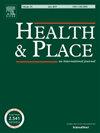灾前收入不平等与灾后心理健康:来自 2011 年东日本大地震和海啸的自然实验。
IF 3.8
2区 医学
Q1 PUBLIC, ENVIRONMENTAL & OCCUPATIONAL HEALTH
引用次数: 0
摘要
背景:我们试图验证收入高度不平等的社区没有能力应对危机这一假设。具体而言,我们检验了灾前收入不平等程度较高是否会增加灾后精神健康状况恶化的风险:我们对 2011 年东日本大地震中幸存的老年人(≥65 岁)进行了前瞻性队列研究,考察了灾前社区收入不平等与灾后心理健康结果之间的关联。参与者的基线调查(2010 年完成)比灾难发生早七个月。幸存者分别于 2013 年、2016 年和 2019 年完成了三波灾后调查。为评估收入不平等程度,利用 2010 年个人收入数据计算了基尼系数,并将其汇总到 98 个社区(范围为 0.05-0.50:中位数 = 0.32),然后将其分为三等分(低、中、高)。抑郁症状和创伤后应激症状(PTSS)是在三次灾后调查中使用有效工具进行评估的。在对灾前特征进行调整后,进行了多层次分析:在不同时期,社区收入不平等程度越高,PTSS 分数越高(2013 年:β = 0.14,95%CI = -0.01,0.29;2016 年:β = 0.16,95%CI = 0.03,0.29;2019 年:β = 0.12,95%CI = -0.01,0.24)。在模型中加入社会资本的变化后,收入不平等与心理健康之间的联系部分减弱(2013 年:β = 0.14,95%CI = -0.01,0.29;2016 年:β = 0.15,95%CI = 0.03,0.28;2019 年:β = 0.11,95%CI = -0.01,0.22):我们的研究结果表明,灾前的收入不平等可能解释了灾后的创伤后应激障碍症状,而且这种关系可能受到灾害相关变化的影响。需要进一步研究揭示其机制,以便提出政策建议。本文章由计算机程序翻译,如有差异,请以英文原文为准。
Pre-disaster income inequality and post-disaster mental health: A natural experiment from the 2011 Great East Japan Earthquake and Tsunami
Background
We sought to test the hypothesis that communities with a high degree of income inequality are ill-equipped to deal with crises. Specifically, we tested whether pre-disaster higher income inequality increases the risk of worse mental health conditions in the aftermath of disaster.
Methods
We examined the association between pre-disaster community income inequality and post-disaster mental health outcomes in a prospective cohort study of older adults (≥65 years) who survived the 2011 Great East Japan Earthquake. The baseline survey of participants (completed in 2010) predated the disaster by seven months. Survivors completed three waves of post-disaster surveys in 2013, 2016, and 2019. To assess the level of income inequality, the Gini index was calculated using individual income data in 2010 aggregated to 98 communities (range 0.05–0.50: median = 0.32) and categorized into tertiles (low, middle, high). Depressive symptoms and post-traumatic stress symptoms (PTSS) were assessed in the three post-disaster surveys using validated instruments. Multilevel analysis was conducted adjusting for pre-disaster characteristics.
Results
Higher levels of community income inequality were associated with higher PTSS scores across time (2013: β = 0.14, 95%CI = −0.01, 0.29; 2016: β = 0.16, 95%CI = 0.03, 0.29; 2019: β = 0.12, 95%CI = −0.01, 0.24). The association between income inequality and mental health was partly attenuated by adding the change in social capital to the model (2013: β = 0.14, 95%CI = -0.01, 0.29; 2016: β = 0.15, 95%CI = 0.03, 0.28; 2019: β = 0.11, 95%CI = -0.01, 0.22).
Conclusion
Our findings suggest that pre-disaster income inequality may explain PTSS symptoms in the aftermath of a disaster, and the relation may be mediated by disaster-related change. Further study to reveal its mechanism is needed for the policy recommendation.
求助全文
通过发布文献求助,成功后即可免费获取论文全文。
去求助
来源期刊

Health & Place
PUBLIC, ENVIRONMENTAL & OCCUPATIONAL HEALTH-
CiteScore
7.70
自引率
6.20%
发文量
176
审稿时长
29 days
期刊介绍:
he journal is an interdisciplinary journal dedicated to the study of all aspects of health and health care in which place or location matters.
 求助内容:
求助内容: 应助结果提醒方式:
应助结果提醒方式:


